Genre: Action-Thriller
Premise: When her family is abducted, a disgraced submariner must pilot a narco submarine to its destination in less than eight hours or her husband and daughter will be killed.
About: Today’s writer is from Kansas City. He studied film at the University of Kansas. This script got him on last year’s Black List.
Writer: Andrew Ferguson
Details: 117 pages
 Cobie Smulders for Cora?
Cobie Smulders for Cora?
In my newsletter I said, “Someone needs to write a new sub spec.”
Well guess what? Someone has!
Let’s see what it’s all about.
27 year old Cora Cameron was training to be a submarine captain when she contributed to killing her partner in an underwater military training exercise. Ever since, she’s been a heavy alcoholic who desperately is trying to have a relationship with her young daughter, Penny, and her estranged husband, Nolan.
One day she’s kidnapped and taken down to Baja, Mexico, where she’s plopped down into the biggest private narco sub in the world. This thing is gigantic. But it’s also brand new and still has some kinks to be worked out. Cora receives a call from a mysterious voice that tells her this is his sub and she has exactly eight hours to deliver it up north to California. Or else her husband and daughter are dead meat.
Cora is joined by a Mexican crew of thugs. Only one of them speaks English. And none of them trust her. To make things worse, the DEA is onto them immediately. So they start flying in planes, floating in boats, all to track this sub. Gamble, the nice government guy, is looking for any way he can help Cora survive this. Huxley, the bad government guy, wants to blow the sub out of the water and end this immediately. Because Cora has to surface her cheaply-made sub every couple of hours, Huxley keeps getting Hulk-smash opportunities.
But then something happens that truly throws everything off (spoiler). It turns out it’s not drugs that they’re hauling, but rather, explosives! And not just small explosives. Collectively, these explosives can take out a pretty big target. The question is, what is that target? And was this always going to be a suicide mission regardless of whether Cora followed the rules? One thing’s for sure. Cora must rely on every trick of her failed submarining career to get out of this mess!
The other day I was watching Shark Tank, a show where people stand in front of a panel of billionaire businessmen and try to get them to invest in their small companies. In the first segment, some woman was pitching her ice cream business. As soon as she was finished, the sharks started asking all these business questions with elaborate acronyms like, “What’s your ROIBMC?” Or, “What’s your bottom top out reverse expectation level for 2022?” The poor woman had no idea what they were talking about and quickly crashed and burned.
Cut to the next team, two flashy tech guys selling something for your car that lowers emissions. The sharks asked them the same questions. But this time, the guys not only had answers, but threw back unique financial terms about the emissions market even the Sharks didn’t know. They ended up getting a deal.
Why do I tell you this?
Because, in screenwriting, you gotta be able to sell us on the fact that YOU ARE AN EXPERT ON YOUR SCRIPT. If you’re writing about submarines, you have to convince me that you are Mr. Submarine Man. I say this as someone who’s read around 75 submarine screenplays. Cause I can PROMISE YOU there’s a big difference between the ones where the writer knows submarines, and the ones where they don’t.
The ignorant writer ignores the details about subs because THEY DON’T KNOW THE DETAILS. And when you ignore the details, you are, by definition, writing a generic story. Have have ever heard of a generic script that has taken the world by storm? Cause I haven’t.
Everything about the submarine stuff here is top notch. We’re repeatedly getting specialized info that only a sub expert would know.
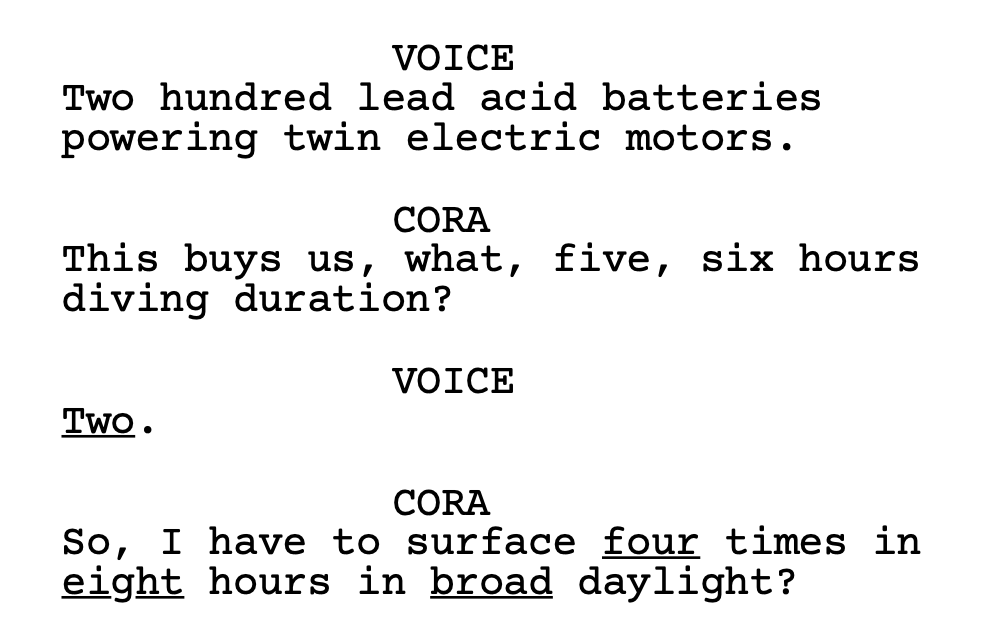
For that reason, I BELIEVED in the story. And believing is critical. Cause it’s what suspends disbelief. But it’s only half of the game. The other half is writing an entertaining story.
One of the best ways to write an entertaining story is to KEEP YOUR READER OFF-BALANCE. The more your reader feels like they’re standing on solid ground, the more you’re losing them. You want the reader to feel off-balance and unsure. That’s when you have them. Think of movies like Memento and I Care a Lot and Parasite and Missing and even Emily the Criminal. Those movies never allow you to stand on solid ground. You’re always a little unbalanced. And that’s great.
Can you get away with not doing this?
Sure.
If you’ve set up characters who we love and a situation we’re emotionally invested in, you don’t need to keep us as off-balance. This is what Taken did so well. We liked her. We liked him. So we wanted him to save her. That’s all we needed!
The problem with storytelling is that even when you set up your characters perfectly, there’s this weird x-factor that you have no control over where, sometimes the characters don’t click with the reader. Even if you’ve done a “good job” with them. Which is why I encourage writers to do your best in the character department and then GIVE YOURSELF INSURANCE with some fun unexpected plot developments along the way.
I’ll give you a great example from the show Hijack, on Apple, about a guy trying to get home but he ends up on a flight that gets hijacked. (Spoilers) The first episode is a relatively straight-forward hijacking. Nothing happens that we don’t expect to happen. As the episode goes on, the main character is watching all of the hijackers carefully.
At the end of the episode, as we’re cutting back and forth between the plane and our hero’s family in the UK, who have been made aware that he’s on a hijacked plane, a cop asks the wife, “What does your husband do?” Then back on the plane, we see our hero stand up in the aisle and brazenly approach the hijackers. Cut back to the family where the wife and son say, “It’s complicated what he does.” “Well, what is it?” “Basically,” they say, “He’s a negotiator.”
We then cut back to the plane where the hijackers see our hero approaching, point a gun at him and ask him what he’s doing. He tells them that as the people on this plane get more rowdy and as they deal with more on more issues on the ground, that it’s going to get harder and harder to accomplish their mission. “So,” he says, “I’m going to help you hijack this plane.”
BOOM.
This is what I mean by a twist that unsettles the narrative. It puts the reader on edge. They’re no longer sure what happens next.
That’s how I judge a lot scripts like Subversion. Do they keep me off-balance? Subversion has one big twist. Which is that they’re not delivering cocaine like they originally assumed. They’re delivering a bomb. Which is a pretty good twist. But is it as good as Hijack? No. Which is a reminder that there is a SCALE to these choices. Not any old unexpected choice will do. You have to be creative. The more imaginative you are than the next writer, the better you’re going to do in this business.
So, for Subversion, I thought it was a solid script. There were a lot of interesting ideas in here, such as the fact that they had to keep surfacing throughout the journey, which put them in danger. Half the movie is about the government people who are trying to neutralize the sub and I liked that some of them wanted to kill Cora and others were trying to pull this off without any causalities. It made for a lot of suspenseful moments.
You wouldn’t be wrong to call this “Die Hard on a sub.” In fact, if the lead character was a 40 year old man and this spec was written in 1994 as opposed to 2023, I have no doubt it would’ve sold for 1.5 million dollars. But, times they have a changed. It’s still a decent script. It could even be a movie. We’ll have to see. I just wanted it to be a little more off-balance.
[ ] What the hell did I just read?
[ ] wasn’t for me
[x] worth the read
[ ] impressive
[ ] genius
What I learned: The better you are as a writer at manipulating emotions – creating characters that make readers *FEEL* things, the less flashy sh— you have to do in your script. If you’ve been told more than once by readers that they’ve teared up reading your scripts, then you can write scripts like Taken and not have to add a lot of flashy plot developments. But if you’re weak with character? You’re more of a concept guy? Or plotting is your thing? Then you definitely need to add more twists and turns. You’ve got to shock the reader more because, the reality is, they’re probably not all that invested in your character’s journey.
Genre: Action/Adventure
Premise: Indiana Jones is pulled into one last adventure when his goddaughter asks him to help her find a dial created by Archimedes that has the power to travel through time.
About: The fifth and final Indiana Jones film, which is said to have cost 280 million dollars, pulled in just 60 million dollars over the weekend, continuing a trend of weak box office showings this year. This is the first Indiana Jones movie not directed by Steven Spielberg. It was directed by James Mangold, who Lucasfilm was so happy with that they hired him to make a Star Wars movie about the origins of the Force.
Writers: Jez & John-Henry Butterworth AND David Koepp & James Mangold (characters by George Lucas and Phillip Kaufman). Phoebe Waller-Bridge is said to have done some script work as well
Details: 150 minutes
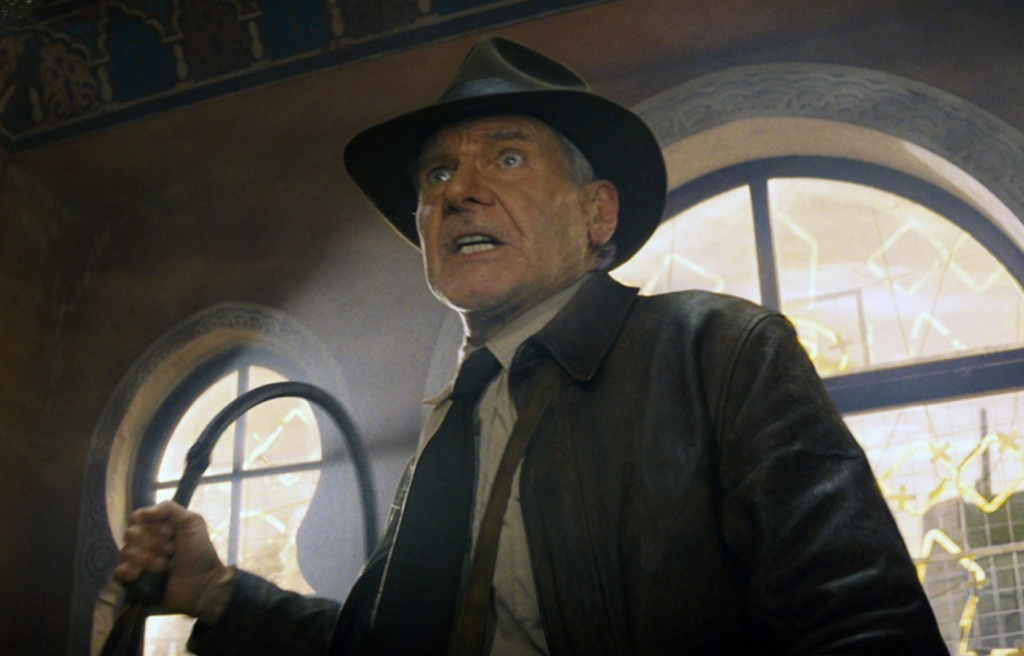
As I approached the digital ticket kiosk to purchase my entry into Indiana Jones and the Dial of Destiny, I attempted to bypass the annoying button prompts by simply humming the Indiana Jones score, figuring the kiosk would know what movie I wanted and simply ask for my credit card info.
Not only did that not happen, the pleasant pimple-faced teenager tasked with monitoring the kiosks came over to ask me if I was okay.
But you know what did happen?
I got to see a good Indiana Jones movie.
It’s unfortunate that Indiana Jones number 5 wasn’t number 4. Cause number 4 was a disaster of epic proportions. It was so bad, in fact, that the screenwriter, David Koepp, came out and said that he knew he was going to be taking bullets for the screenplay. That NEVER happens, where the screenwriter admits before the movie has come out that it’s bad.
Dial of Destiny, even though it’s not a perfect film, is a film where you can tell they did everything in their power to write a good screenplay.
The thing with the scripts for these gigantic blockbuster movies is that they’re often less about writing a cohesive story than they are pleasing the 10 major creative forces on the film, and patching together the ugly disconnected mess of ideas from those forces with bridges just strong enough to keep the movie together.
That’s not the feeling I got from this movie at all. Maybe it’s because this was the last Indiana Jones and they didn’t have to worry about setting up future storylines. Which meant they could write the best story possible. Or maybe they just sat down and kept at it until they got the screenplay right.
The film is set in 1969. I think Indiana is 75 years old in this iteration. He lives in New York by himself in some apartment downtown. Unlike the glory days when he was young and sexy and girls used to blink at him with “I luv you” written on their eyelids, now Indiana is old and no one cares about his lectures anymore. Which is probably why he retires.
Indiana gets a drink at a local bar and is approached by Helena, his goddaughter. Helena tries to get Indiana to don the hat and whip one more time to search for something called the Antikythera, a dial that Archimedes created that is rumored to be able to manipulate time. Indiana then surprises Helena by bringing her back to the school and showing her that he already has the Antikythera. Or, at least, one-half of it.
This is when it’s revealed that Helena is not a very cool goddaughter. She steals the Antikythera and heads off to Africa to sell it. Around this time, Indiana learns that a Nazi named Dr. Voller is looking for the Antikythera as well and may have some nefarious use for it. Which means that old Indy will have to don the hat and whip again. And off he goes.
In true 2023 blockbuster McGuffin fashion, there are multiple McGuffin pieces to search for. Indy and Helena reluctantly join forces, traveling around the world to find out where the second half of the Antikythera is. Just when they find it, Dr. Voller sweeps in and takes it, and then takes *them* on a time-traveling trip to the beginning of World War 2, where he plans to win Germany the war. Except they don’t end up in 1939. They end up in 214 BC. And not even Indy knows how they’re going to get back home from here.

Here’s the thing about this movie. It’s probably the best Indy movie outside of the first one. With that said, I’d still rather watch the first three again than I would this one. How does that make sense? Because an action movie with an 80-year-old star just doesn’t work. To be fair, Harrison Ford is probably the only actor on the planet who could make an 80-year-old action movie work. But it still just feels wrong. Which is why I’d still rather watch those first three films.
But anyone saying this isn’t a good movie is crazy.
It’s a good movie. Maybe even a really good movie.
And I’m going to give you a comp so you understand why this movie is good. Jurassic World Dominion. Both these movies are trying to do similar things. They very much operate in the same universe. They even try to rip off a combo of Indiana Jones and Han Solo to make that awful pilot character Kayla Watts.
The difference is that this screenplay is a million times tighter. Jurassic World Dominion is the bad version of Dial of Destiny. It’s what could’ve happened if bad screenwriting would’ve reined.
The McGuffin was cool. There were always goals, stakes, and urgency. The bad guy was cool. The dynamic between Indiana and Helena was strong. Keep in mind that this was the first we’ve ever seen a female co-star with Indy that wasn’t a love interest. That alone made their dynamic feel fresh. Most importantly, the writers did a really good job keeping the reader up to date with what was going on.
I always knew what leg of the story we were on and what they were after. This is something Hollywood has gotten so lazy with recently, especially in the last phase of Marvel films, where the plot not only got convoluted, but the writers didn’t prioritize keeping you up to date with what the characters were after and why it was important. These writers on Dial of Destiny did a great job of that.
It sounds like some people had a problem with Helena. Like I said, I thought the dynamic was interesting between her and Indy. I always look for twists on the conflict between the movie’s primary team-up characters and this movie had that. If Helena would’ve just been some random chick who hated Indy and that’s where the conflict came from, that would’ve been boring. The fact that she’s family, though, adds another layer. It creates a “positive” that’s pulling at their dynamic as opposed to just a “negative.” I liked that.
I just want to take a moment to appreciate what’s happened in Phoebe Waller-Bridge’s career. Phoebe Waller-Bridge was a nobody until someone forced her to write this play called “Fleabag,” which she then turned into a show, which received a lot of acclaim, which got her meetings everywhere. And the next thing she knows SHE’S SHARING SCREENTIME WITH HARRISON FORD ON AN INDIANA JONES MOVIE.
ALL THIS HAPPENED BECAUSE SHE WROTE SOMETHING. I said the same thing about Taylor Sheridan in my newsletter. He was a nobody. Now he owns a ranch as big as Los Angeles. All because he wrote something. Everybody who’s reading this right now. Know this: You have a very powerful tool in your hands. If you use it well, who’s to say you can’t be on a giant franchise set in three years? It seems impossible but it obviously isn’t. Phoebe Waller-Bridge is proof of that.
Okay, back to the review.
Some people didn’t like the crazy third act. A few of you will probably wonder how I can prop up this screenplay with a third act this bonkers. I’ll admit that the third act doesn’t quite work. The movie didn’t do a good enough job setting it up. What does this time and this war really have to do with Indiana Jones’s legacy?
In regards to screenwriting, though, here’s the way I see it: Good writers take risks. They take big swings. So I admire Mangold and all the writers who worked on this taking a big swing like that. It didn’t quite work. Okay. But I’d rather take that big swing than aim for that double out to right-center field. If you’re going out, as the Indiana Jones franchise is, go out swinging!
This is the second best-written Indiana Jones movie of the five films. Period. But, as a movie, it’s limited by its 80-year-old action star. Which is why I wish they would’ve made this the 4th film and ended the franchise there. Indy at 63 could’ve made everything here a lot more convincing. RIP Mutt.
[ ] What the hell did I just watch?
[ ] wasn’t for me
[x] worth the price of admission
[ ] impressive
[ ] genius
What I learned: Pacing vs. Character Development. You’ll often have to balance how much character development you can include in a script versus how fast you can keep your story moving. One of the problems people had with Helena is that she’s very capable in dangerous intense action-packed situations. But how? We’re not given enough information on that. Here’s the answer: I can almost guarantee that that information was in earlier drafts of the script. But they needed to keep the pace moving. And when you need the pace ratcheted up, the first thing that goes is character development on SECONDARY CHARACTERS. You don’t take character development away from your hero. You take it away from the other characters. Which is why Helena feels a little thin. In the end, they left us with some quick mug shots of Helena, which indicated she did have a rough and tumble past. But it wasn’t enough to truly explain everything she was able to do. In a perfect world you would have both pace and character development. But if you have to choose, script pace is more important than secondary character development. So lean towards pace. A sloggy script read will negate any care we have about your characters anyway.
Note: I am taking the holiday off tomorrow. Happy 4th everyone! Seeya Wednesday!
Genre: Teen Comedy
Premise: When two high school seniors discover a robot from outer space, they ignore its warning of an imminent alien invasion and reprogram it to help them score with chicks!
About: This is the logline that won the June Logline Showdown. Congrats to E.C. for the big win. He had to beat out six contestants instead of the usual four. So good job, E.C. Next month’s (July) logline showdown is for TV pilots. If you have a TV pilot logline you would like to enter, e-mail me at carsonreeves3@gmail.com with your title, genre, and logline, by Thursday, July 20th, at 10pm Pacific Time!
Writer: E.C. Henry
Details: 118 pages
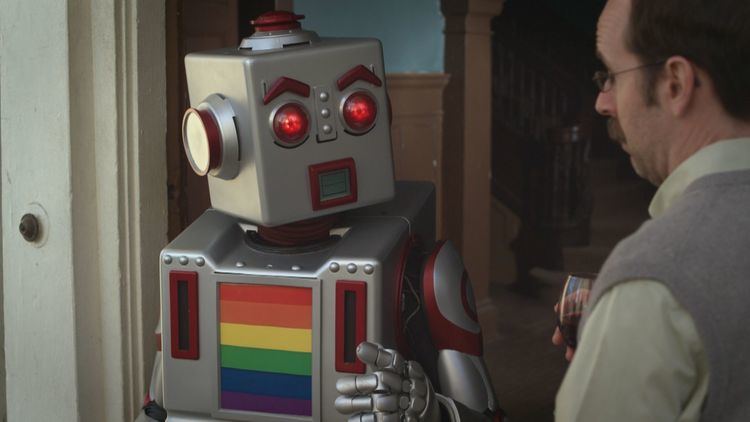
Not many people had E.C. destroying the Logline Showdown competition on their bingo cards. Yet here we are. His win comes with a collective question from the Scriptshadow community: Does the script contain lit expression, E.C.’s trademarked writing style that includes varied colorful fonts? I can answer this question, which will excite some but upset others. Because this script was a written a decade ago, it is PRE-lit expression.
Now, on to the logline itself. Why did this logline do so well? Obviously, it’s funny. A robot shows up and says, “Your entire world is in danger,” and the guys respond by reprogramming it to help them score some ladies.
But I think there’s a deeper level to this concept that elevates it above just a quick laugh. Which is that, to a 17 year old male high school virgin, getting laid is EVERYTHING. It is all you think about. So, in a weird way, there’s this universal truth to their clueless decision. For them, OF COURSE getting laid is more important than the impending end of the world.
Now let’s check out if the script is any good.
High school teens, Chip, and his best friend, Dennis, are trying to make it through senior year. Chip is stuck with a girlfriend, Gretchen, who he doesn’t like. Who he really wants is the prettiest girl in school, Daphne. The problem is that Daphne is with cool jock, McGroover.
So Dennis and Chip try to come up with creative ways he can win Daphne over, which include sneaking up to her bedroom unannounced wearing a Three Musketeers outfit. And what do you know, it kinda works! Daphne thinks Chip’s gesture is creative and gives him a kiss through the window.
Meanwhile, a billion miles away, we meet an alien race of hawk-winged people called the Teltides, who send a scout to earth, who immediately impersonates a father in the neighborhood named Mike. On that same planet, an underwater species sends their robot, Bubblehead, to warn earth what the Teltides are up to – which amounts to destroying humanity.
When Bubblehead arrives, it is Dennis and Chip who first run into him. And right as they do, Bubblehead stumbles out of his ship and short-circuits. So the friends take him back to Dennis’s where Dennis works on him and brings him back to life. The annoyed Bubblehead warns them about the alien invasion but Dennis and Chip ignore him and bring him to school.
Hilariously, bringing a walking talking robot to school doesn’t provoke much attention. Even the teachers seem okay with Bubblehead hanging around. When a big party then gets announced, the best friends realize that their female problems are going to come to a head. Will they be able to overcome them? And, oh yeah, will the aliens attack and destroy the world?
I could sense E.C. was a little nervous about this review. I think we’d all be nervous about revealing decade-old writing. But I remember Harrison Ford promoting the 1997 special edition of Star Wars where a previously unused scene of him would be placed in the movie. Ford was asked whether he was nervous before the screening and he said, “Yeah,” defiantly. “It’s 20 year old acting.” If Harrison Ford can be afraid of an extra scene with Han Solo, I’ll allow E.C. to be afraid of an old script.
So, Bubbledhead Saves the Day is similar to a lot of the stuff I read from E.C., which is that it has these brilliant little moments but they get usurped by issues with the storytelling. For example, when Bubblehead is first called upon to give his opinion on Chip and Dennis, this is what he says: “Fine. I’ll tell you what I think. You are a conspirator. A man of low, moral character.” And then: “That’s right. I came to this planet with a message of dire importance for the leaders of this world to consider, yet those who discovered me saw it more fitting that I be reduced to serving typically overpriced, caffeinated beverages to their fellow members of this low order of education, as a means of subversively elevating their own social status amongst their peers.”
This is EXACTLY what I was hoping for when I read the script. A goofy funny robot that these guys are trying to use to their benefit.
But there’s so much standing in the way of us getting that. For starters, there needs to be 70% less description in this script and 70% more dialogue. High school comedy scripts are DIALOGUE-DRIVEN SCRIPTS. The only time there should be a lot of description is during the set pieces. Otherwise, I shouldn’t see any descriptive paragraphs at all. It should be all dialogue.
In fact, the majority of this script should’ve been ONLY Dennis, Chip, and Bubblehead talking. If this was a dialogue script that had these three arguing with each other 90% of the time, it would’ve been hilarious.
To E.C.’s credit, he added an element that I didn’t expect, which was that Bubblehead is resistant to his programming. Which I think is perfect for a 2023 version of this movie, because you could have Bubblehead be a stand-in for the ultra-socially-progressive Chat GPT, which doesn’t want these guys hitting on women. It could be giving them all the “socially acceptable” advice to pick up women, which of course never works. That could be really funny.
But, none of that stuff matters when I can’t even get a feel for who the main characters are in the first act. I thought Mike and Todd may have been the main characters at first. I didn’t even know Dennis and Chip were best friends until the second act, when we actually start getting scenes of them together.
I understand that writing a high school comedy is tough because you’re going to have a lot of high school characters in the story. And you have to introduce them somewhere and somehow. But those introductions shouldn’t come at the expense of us understanding who our lead characters are.
I can’t emphasize this enough. If your first act is confusing in any way, it’s very hard to recover from that. It’s like trying to recover from a bad first impression. The other person has already given up on you. I had to fight my way back into understanding this story after the first act.
And the fix is easy. 75% of the first act, focus on Chip and Dennis. Use the other 25% to introduce the other key characters. And then you can always introduce anyone else who didn’t make the first act at the beginning of the second act.
The other major faux pas is that we’re not delivering on the promise of the premise. I didn’t start getting anywhere close to the logline I read until page 60. And even then, it wasn’t enough. Bubblehead is probably your funniest element and he’s barely in the movie.
That’s not to mention that Chip isn’t even having problems with women! He’s got two women on his jock! If the whole premise is that these guys need help to get laid, then let’s show them as cute hopeless incels. They can’t get women to notice them for their life. Actually, now that I think about it, I don’t even think that Dennis cares about getting laid. Which is supposed to be the point of the movie!
So, unfortunately, this didn’t have the necessary foundation to breathe life into the fun premise. I still think it’s a great idea. But it needs a reevaluation and fresh approach in order to work.
But one more prop for my man, E.C. Anybody who names their principal character, “Principal Bumpkins,” gets a smile from me.
Script link: Bubblehead Saves the Day
[ ] What the hell did I just read?
[x] wasn’t for me
[ ] worth the read
[ ] impressive
[ ] genius
What I learned: It is critical in genres (high school movies, war movies) that have a large group of central characters, that you really strategize how you’re going to introduce them so that they’re all unique and easy to identify. Cause, as readers, if we’re meeting 15 high schoolers, how easy do you think it is for us to remember who’s who? And how all those characters relate to one another? It’s not easy at all. So introduce your main characters first if possible. Give them big luxurious descriptions so we know they’re important. Give them names that are easily differentiated from one another, and that, hopefully, sound like the person. “Waldo,” for example, would place the image of a nerd in the reader’s head. And just be very specific and detailed in regards to how everyone is related (Joe is best friends with Frank. Emma is the daughter of John). You have to hold our hand with that stuff because it’s some of the easiest stuff for the reader to forget.
We’ve got aliens. We’ve got submarines. We’ve got some criminally affordable notes to the lucky few who e-mail me quickly. We’ve got the COVER FOR MY NEW DIALOGUE BOOK. That’s right. It’s really happening! I share my thoughts on the new Zendaya tennis movie trailer, that controversial Taylor Sheridan profile in The Hollywood Reporter, and I review yet another short story that sold, this one directed by one of my favorite young horror directors.
Unfortunately, there will be no official post today (Thursday) so you’ll have to get your full Scriptshadow fix from the newsletter. However, don’t worry. The Scriptshadow week is not over because tomorrow we review our Logline Showdown winner: Bubblehead Saves The Day – “When two high school seniors discover a robot from outer space, they ignore its warning of an imminent alien invasion and reprogram it to help them score with chicks!”
If you haven’t received this newsletter or haven’t received any, e-mail me at carsonreeves1@gmail.com and I’ll add you to the list!
Genre: Dystopian/Horror
Premise: Twin sisters live in a commune where, once they hit puberty, one of the twins becomes a monster and must be killed. But when the twins learn that their community is keeping big secrets from them, they make a run for it.
About: This script finished on last year’s Black List with 9 votes. Alexander has written a couple of short films that he’s directed.
Writer: Alexander Thompson
Details: 117 pages
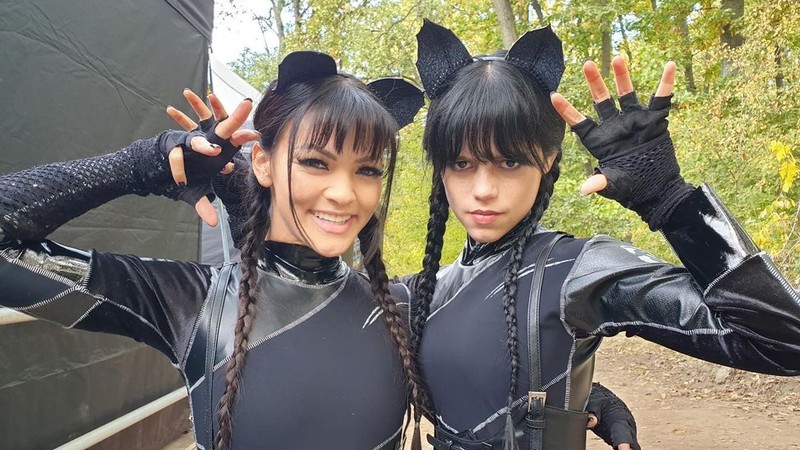 Jenna Ortega playing twins?
Jenna Ortega playing twins?
Reading scripts that don’t fall under your genre preferences is always a difficult thing. But you have to do it. You have to step out of your comfort zone. Because you never know when you’re going to read that really unique screenplay that blows you away.
With that said, these dystopian commune/lab stories have always felt like a house of cards to me. They never have a lot of meat to them. From Spiderhead to The Giver to Divergent to Equals to The Maze Runner. They give you that one rule that makes their story different from all the others. But the rule is so basic that it doesn’t have the strength to hold up an entire movie.
The only one that worked was The Hunger Games and that’s because it leaned more into its high concept than its dystopian commune genre roots. A movie about kids who have to kill each other, the ultimate irony, is a slam dunk. But all the rest of these might as well be constructed with balsa wood.
I hope to be proven wrong.
Aurora and Gabrielle are 16 year old twins. Which is unusual in our odd dystopian setting. They live in a giant commune in the countryside full of twins. And when the twins go through puberty on this commune, one turns into a rabid monster and the other doesn’t. The town then quickly kills the dangerous monster and the surviving twin moves on with their life.
Aurora, the good girl, and Gabrielle, the bad one, are way past due. Which makes them the focus of everyone’s untrusting eyes wherever they go. One day, when a guy friend of theirs turns, Gabrielle and Aurora find his new monster-self hiding, and realize that he’s totally coherent. He’s not some violent crazy monster like they’ve been educated to believe.
With this shocking new information, Aurora and Gabrielle go on the run, heading into the countryside and staying at a motel. But when they’re recognized, the cops come and grab them, but don’t take them back home. It turns out these monster things are worth a pretty penny on the open market. So Aurora and Gabby escape THEM and that’s when they meet Marty.
Marty is a kind woman who lives in the middle of nowhere. She knows who they are and doesn’t care. She feeds them and tells them they can stay here was long as they want. But one day Aurora follows Marty into the forest to find that she’s locked up a monster in a barn. Not just any monster – Marty’s twin. Yes, Marty once belonged to the commune as well.
It appears that Marty is either going to feed these two to her monster brother or have them mate or who knows what else. Aurora and Gabrielle will have to make one last escape, an escape that will be aided by one of them finally turning.
Ooh boy.
Okay.
This is a typical 2020s Black List script.
It’s got some good stuff in it. But there are just as many times when it feels like it’s being written by a beginner.
The overwriting in particular. Goodness me!
I’ve read so many scripts at this point that I know, when I see the genre, EXACTLY what the page length needs to be for that script to be in its genre sweet spot. If the page count is either shorter than that or longer than that, I know the script won’t be good. This is a 105-110 page concept.
The problem is that it’s overwritten. Every paragraph could be cut in half. For example this: “AURORA has followed her. Gabrielle shakes her head, ‘You needn’t come along’… But Aurora ambles quietly to her side, and onward they go together.” Could easily be: “AURORA follows along. Gabrielle shakes her head, ‘No.’ But Aurora insists and they continue on.’”
You may look at that and think I’m nitpicking. Trust me. When there are 1000 paragraphs in a script that all read too bulky? That drives the reader insane. More importantly, it slows your script waaaaaay down. Which was a huge problem here. I thought I was on on page 45. I checked and I was still on page 24. That issue was specifically due to this overwriting.
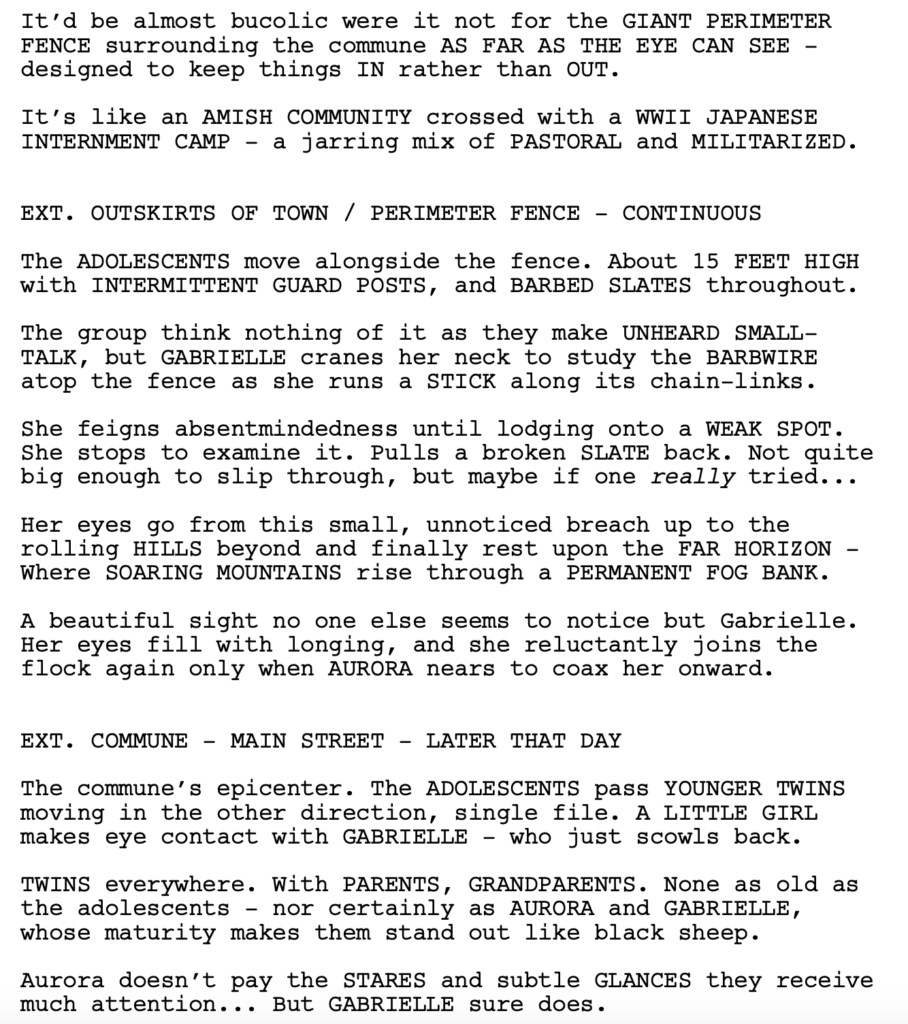
And by the way – yes, it’s better to break your action-description paragraphs up into 3-line chunks as opposed to writing 10-line paragraphs. But if you’re writing an entire page of 3-line paragraphs with no dialogue, it’s not that different from a reader having to read 2 15-line paragraphs. It’s still a wall of text.
So the solution is to cut down the overall words that you’re writing. Cause chances are you’re using a lot more words and sentences than you need to. ESPECIALLY if you’re a beginner. Beginners always make this mistake. And it’s a huge reason why they don’t get responses after script reads. It probably doesn’t have to do with the story content as much as the reader getting frustrated by the endless of chunks of needless sentences they have to endure.
This script suffered big time from that.
Now, like I said, it wasn’t all bad.
The story is built around a strong line of suspense. We know that one of these girls is going to turn into a monster at some point. That’s a nice dangling carrot to keep us turning these overwritten pages.
There’s contrast between the two main characters, the sisters. Gabby’s a shark. Aurora’s sweet. What this does is that every time the two encounter an obstacle, they’re going to have different opinions on how to solve the problem. That’s where you get your conflict. And if you add some urgency to those situations – such as there’s a cop coming downstairs in five seconds and a decision needs to be made – you’re going to come upon some entertaining moments.
Also, once they leave the commune, the script becomes a million times better. Getting through that sludge-like opening act was like trying to run during a nightmare. You’re not going anywhere. I think at one point I had turned the page only to find out I’d somehow gone backwards.
Why is that? Well, because the first act was built entirely around WAITING AROUND. I’ve told you guys this before. “Waiting Around Narratives,” are some of the most boring narratives you can write. Movies work best with active characters, not passive characters. Once these two become active and go on the run, the script gets a shot of adrenaline.
It wasn’t enough to win me over, though. The YA lab genre has always been uninspiring to me. I feel like anyone could come up with one of these concepts in thirty seconds. Here, I’ll come up with one right now. Children are all raised in a remote commune. At 10, all girls become vampires and all guys get telepathy. Boom, there’s a YA concept for anyone who wants it.
I’m joking but they really do come off like that sometimes.
I will give this script credit for making me care more than I usually do for this genre. But the overwriting and the fact that it’s not my thing makes this a ‘no thank you’ on my end.
[ ] What the hell did I just read?
[x] wasn’t for me
[ ] worth the read
[ ] impressive
[ ] genius
What I learned: Don’t listen to me when it comes to the commercial viability of YA concepts. I may not like them but a lot of people do. So if you like YA, write a YA script. I would extrapolate that advice beyond YA. Don’t make decisions about what you do or do not write based on one person hating that type of movie. In the end, if you’re passionate about the concept and think you’ve got a great idea where you can bring something fresh to the script? Then go ahead and write that script.
What I learned 2: Also, for all my bickering about this subject matter, I give credit to the writer for writing a coming-of-age movie with a marketable slant. This is way more interesting than if it had been yet another script about a girl coming of age in her boring small town.


